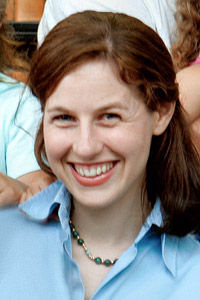After Supreme Court clerkship, Klingele back teaching at UW Law School
One of the most memorable moments of Cecelia Klingele‘s yearlong U.S. Supreme Court clerkship wasn’t crafting an opinion on a particular case or listening to an oral argument.

Klingele
It was playing Justice Ruth Bader Ginsburg in the clerks’ annual skit for the justices — who expect a witty performance during the clerks’ busiest time of the term — singing a duet with a colleague clad as new Justice Sonia Sotomayor.
“Afterwards, I thought, ‘I can’t believe I just did that in front of the entire Supreme Court, what was I thinking?'” she recalls. “Justice Ginsburg was a good sport, they were all good sports, they’re used to it.”
Klingele earned a rave review — both for her work for the court and for her turn as Ginsburg — from her former boss, Justice John Paul Stevens.
“She was the star of the show,” Stevens says. “She really was a fine performer, as well as being an excellent lawyer.”
After an intense year that saw her writing memos, reviewing facts for oral arguments and summarizing cases for Stevens — a workload that meant she spent a number of nights on the couch in her office — Klingele, a 2005 graduate of the University of Wisconsin Law School, returned to Madison this fall to start a two-year teaching appointment as a visiting assistant professor. This semester she is teaching criminal law to a small section of first-year law students.
“I love interacting with students and colleagues,” she says. “I think the law school environment, particularly here at Wisconsin, is a wonderful place from which to both study the law and try to have an effect on the world.”
Walter Dickey, George H. Young law professor and faculty director of the Frank J. Remington Center, says it was a coup for the Law School to hire Klingele after her clerkship and calls her a role model for the students she’s teaching.
“We’re really lucky to have Cecelia here,” Dickey says. “She brings an incredible energy and imagination to the whole enterprise, and the more of that we can get, the better.”
Klingele says she was honored to be selected for a Supreme Court clerkship, which she says gave her a unique vantage point over how justice is administered in the U.S.
“My former circuit judge used to say becoming a judge is like getting hit by lightning, and becoming a Supreme Court clerk is every bit as random,” Klingele says.
Klingele got the call from Stevens offering her the clerkship minutes after she interviewed with the justice and Stevens’ clerks at the time.
“She was a wonderful law clerk, she’s an excellent lawyer, she’s a very charming person and she has a beautiful family,” Stevens says. “She’s very well prepared in everything she does.”
Each of the nine justices has four clerks in a term, and clerks have three main responsibilities, Klingele says: Reading roughly 10,000 petitions for review and advising justices on what to do with them; helping justices prepare for oral arguments and issue opinions in cases before the court; and reviewing the facts and law behind upcoming executions in case the court is asked to intervene in last-minute legal proceedings.
Although Klingele can’t talk about specific cases on which she worked, she says the term was marked by an unusually broad array of issues and a number of cases in which the court overruled or limited the interpretation of prior precedents.
“It was especially interesting to be Justice Stevens’ clerk because he’s been around the court for so long, he has the institutional memory the others lack,” she says. Stevens has been on the court since 1975.
Klingele honed her law skills during a series of clerkships that she says has given her an up-and-down look at the federal court system. She spent two years as a law clerk for Barbara B. Crabb, chief district judge for the Western District of Wisconsin, and another year in Jacksonville, Fla., with Judge Susan H. Black of the U.S. Court of Appeals for the Eleventh Circuit.
“She’s someone who can bring out the best in other people,” Crabb says. “Cecelia goes the extra mile — or six — and everybody who knows her thinks she must be their best friend. She has that way about her.”
Klingele’s blend of strengths — including persuasive writing skills and an ability to quickly grasp cases — are unusual in a clerk, Crabb says.
In addition to teaching, Klingele is researching methods of corrections supervision in the current economic crisis, which has left states struggling with how to manage their prison populations without endangering public safety. In Wisconsin’s current two-year budget, state officials and lawmakers included changes to sentencing rules that will allow nonviolent offenders to take time off their sentences for good behavior.
“Currently, a record one of every 100 adult Americans is serving time behind bars,” Klingele says. “There’s a real need for lawyers to study how legal authority can be used in a way that enhances public safety while providing more options than just imprisonment.”
Crabb says Klingele’s research is in one of the most exciting fields of law at UW Law School, which Crabb says has a nucleus of smart, provocative thinkers in such areas as criminal justice, the effect of long prison terms and alternatives to imprisonment.
“I think she’ll be a great addition to that group,” Crabb says. “It’s just a great area of research, and there’s all kind of potential for making a real difference in what happens in the world and our country.”
Tags: faculty, faculty and staff, law


